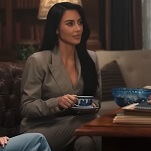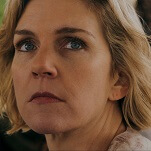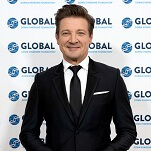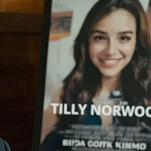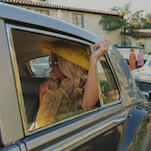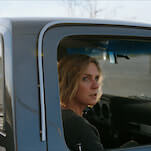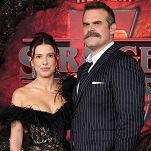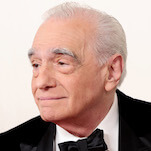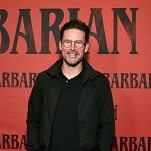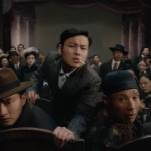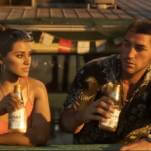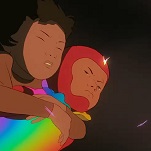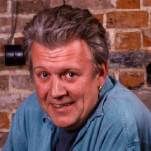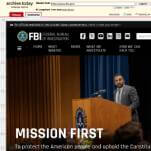Greta Gerwig’s name was once synonymous with mumblecore, but that’s changing. In the late ’00s, she appeared in a string of low-budget films defined by their off-the-cuff feel and an overlapping cast and crew list. These included Baghead for the Duplass brothers, and three films with Joe Swanberg: LOL, Hannah Takes The Stairs, and Nights And Weekends, the last of which she co-wrote and co-directed. Since then, Gerwig has appeared in a variety of independent and big-studio films, including Greenberg, No Strings Attached, and Arthur, proving that her tastes don’t run only—or even primarily—to the off-the-cuff and unscripted. She couldn’t ask for a more consciously scripted world than that of Damsels In Distress, the first new film from director Whit Stillman since 1998’s The Last Days Of Disco. Gerwig plays Violet, a college student with fixed ideas on how to improve the world through good hygiene, good manners, and dance. Gerwig recently spoke to The A.V. Club about the persuasiveness of Violet’s thinking (and Stillman’s), and how she can’t memorize her lines until she starts moving around.
AVC: Do you find that’s common with other actors?
GG: I don’t know. I don’t think so. I’m not really capable of memorizing stuff without moving around, that’s how I do it. And then it’s like I don’t even have to try. So Whit’s stuff was great, because he would give precise blocking, and the words would be just be there for me.
AVC: What was the first Whit Stillman film you saw?
GG: The Last Days Of Disco, not when it was in theaters, but shortly thereafter. And I remember it being advertised when I was young, in theaters. But that was the first one I remember seeing. And then subsequent to that, I think I saw Metropolitan, and then Barcelona. Then the episode he directed of Homicide with Chris Eigeman [“The Heart Of A Saturday Night”].
AVC: What about those films connected with you?
GG: I was drawn to Whit’s writing because, I think the movies I grew up loving, the movies I really love—I grew up watching a lot of plays and musicals and movie musicals. But I love Howard Hawks and Preston Sturges, and Ernst Lubitsch, and fast-talking people, and really precise, witty dialogue. And there’s something very reminiscent of that work in Whit’s work, and I think that it’s incredibly rare. I think there are just very few auteurs in film right now who, so much of their vision is through language and dialogue. He has a strong visual sense, but I think the biggest part about his filmmaking is the words.
AVC: The sensibility of this is different from his other films in many respects.
GG: It’s much more surreal.
AVC: And where the dialogue has always been very stylized, in this case, the world is stylized. Is that what you were expecting?
GG: I don’t think we totally knew. We did know it was different than the other ones. I mean, I was thrilled with how different it was, and strange.
AVC: It’s remarkable for a director to come back after such a long time with something that’s not what people expect.
GG: I know. I mean, in some ways, it is distinctly Whit Stillman, but in other ways, it’s totally—it’s like an alien made it. But in a good, interesting way. I think the big thing was, all of us in the cast, we just had the sense of “We don’t even really know how this is going to work all together.” I think there was a sense of, we felt like we were dealing with the known entity of Whit in a totally unknown situation. This script felt so different, so impossible to predict. And also, when you’re making a film, you kind of forget how strange it is, or how strange the characters are, because you’re just so invested in what’s going on minute to minute. Then I took a step back and I was like, “Oh man, that is a really peculiar film.” I mean, no one else could have made it, it’s not like anything else. It’s like this ecstatic, candy-colored fantasy that’s sort of in the real world and sort of not. But I have a great love of what comes after, what is kind of like the canon for people. I like musical groups that have—I like the Who album from the ’80s. I like the McCartney music of the ’80s. After you do the thing everybody thinks you’ve done, then what do you do? And I like those things, and I felt like participating in this movie was a bit like being in Wings or something.
AVC: It’s kind of interesting to see how people fit into stuff that’s not the era they defined.
GG: Right, exactly. Hopefully he does another two or three, in short succession, because I think he has another three. I think he might work in spurts, and get a few films out that feel more in this slightly heightened vein, and I can’t wait to see them.
AVC: How do you find the humanity of your character in a world that’s on the cartoonish side?
GG: I think the big thing is, for Whit, this is naturalism. Everything Violet says and thinks about is something he’s thinking about and he thinks is right. The ideas she espouses about good dressing and learning clichés and using tap-dancing and perfume to fight depression, those are all things he really believes in. That’s not fake for him. So for him, it’s totally legitimate points to be making. I mean, he knows it’s funny, but it’s completely sincere. I think the boy characters are the most broad and farcical elements. And I think that’s because Whit has some disdain for frat boys. He’s not crazy about them, so he makes fun of them.
AVC: That’s not a shocking revelation.
GG: No. But he loves sharp-dressing ladies. And certainly the character of Violet, he’s said to me and to other people that he identifies more with Violet than he has with any other character he’s ever written. So in that way, I felt like I just kind of became a female Whit. That’s almost how I thought about it. The first week, I would struggle to find the tone. I mean, the first week of a movie is always the hardest, because nothing is set, so you have to imagine the whole movie. Later in the movie, you’ve already shot things, so you don’t have to imagine what you’re talking about. You did it, and it’s somewhere stored in you. But the first week of a movie is hard, because everyone’s struggling to find their footing. But he would always—I would always give a performance the first take or so, and he would say, “Can you do less, can do you it more naturally?” He would always run up and say, “Can you just do it normal?” And I would have to kind of think, “Well, I’ve never said anything like this, or done anything like this, but he wants it like he would say it, because he does say these things.” He’s not a demonstrative person, or an over-emotional person, so when you bring a lot to it, it’s alarming for him. He wants you to simply make your points.
AVC: Do you find any of those points of view persuasive?
GG: Totally. Totally persuasive. By the end of the movie, I thought, “She actually doesn’t say anything that sounds so crazy.” The only thing I don’t agree with—and I talked to Whit about this, and he told me it was her defense mechanism—was that you should date doofuses or sad-sacks, to try and make them better people. And he said, “No, that’s just Violet. She doesn’t want to risk getting hurt, so she dates these loser guys.” But all her ideas about tap-dancing helping you be less depressed and all of that, I think all of that is really true. It does help people be less depressed. I think any form of physical exercise helps you feel better about yourself. But it’s social. You’re participating with a group of people, you’re moving your body, you’re singing. I think it’s good.
AVC: It’s interesting that you’re attracted to precisely scripted works. Your early films seemingly weren’t that way. And before that, you were a playwright. Were the plays you wrote closer to the more precisely scripted screenplays?
GG: Yeah, they aren’t stylized, but they are. I like things that feel like life, but aren’t—I don’t like hyper-naturalism. I don’t like things that feel unwritten, actually. But I like things that closely imitate life but are “off” enough to almost seem absurd. I loved Margaret, and I love Kenneth Lonergan’s stuff because it sounds like life, kind of. But all the word choices are very precise, and the rhythms are very precise. So it sounds like casual poetry. And I like things that sound like that. That’s the kind of writing I strive for, though I don’t always achieve it. My favorite writer is Mike Leigh. I’m attracted to Mike Leigh because I love his work, but also it’s just interesting. I didn’t know how he wrote what he wrote, and when I found out that he would build characters with the actors through improv and then take it and shape it, that made total sense to me, because so much of the acting work I did was almost like sketching for writing. When I did work that was largely improvised, it was almost like I was writing out loud for a lot of it, because I would push a scene in a direction or think something was interesting to say, and kind of be spinning it in my head while I was performing it. And it was incredibly useful, and really yielded some interesting things. But now I’m more interested in what happens after you get that initial impulse out and then you shape it.
AVC: Are you writing anything now?
GG: Yeah, I wrote a film, and I shot it over the fall. And it should be in festivals this fall, or maybe we’ll wait until Sundance. I wanted to do it very under-the-radar. I acted in it and I wrote it. So that’ll be a taste of my writing.
AVC: Does it have a name?
GG: Right now, it is secret and untitled.




